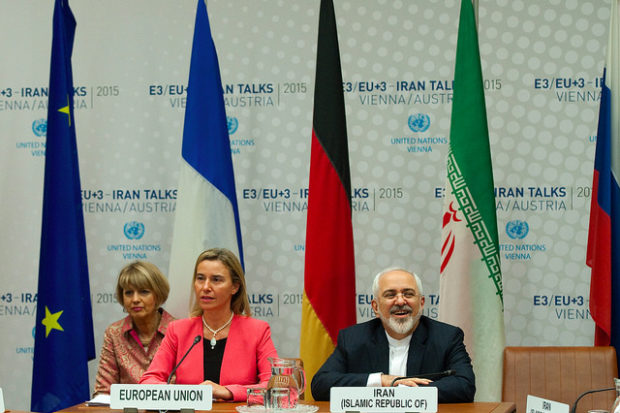
By Gerry Bill
If there were a Nobel Prize for “Greatest Threat to World Peace,” perhaps Donald Trump should be the first one to be nominated for it. There could be many bases for nominating him, but the one that stands out at this moment is his breaking of the Iran nuclear deal, formally known as the Joint Comprehensive Plan of Action (JCPOA).
The Deal
Parties in the deal agreed they would eliminate specified sanctions against Iran if this country took certain specified steps to guarantee it could not produce nuclear weapons in the near future. The deal was signed in July of 2015 by Iran and the other six countries involved in the negotiations (the US and four other permanent members of the UN Security Council, plus Germany). Although not a country, the EU also signed the deal. Implementation began in January of 2016.
Up until Trump’s May 8, 2018 announcement that he was going to break the deal, compliance by all parties was pretty good. The US and other parties reduced sanctions, and Iran began dismantling its nuclear weapons production capacity. At the time of the agreement, estimates were that Iran had enough enriched uranium on hand to produce up to ten nuclear weapons. The deal requires a 98% reduction in Iran’s stockpile of nuclear materials. If the deal were to end, it would take Iran 10 to 15 years to reproduce that stockpile.
Iran’s end of the deal is closely monitored by the International Atomic Energy Agency (IAEA). The Director General of the IAEA, Yukiya Amano, issued a statement the day after Trump broke the deal.
He said, “As of today, the IAEA can confirm that the nuclear-related commitments are being implemented by Iran.” He called the agreement “the world’s most robust nuclear verification regime.” Even Trump, in his announcement that he was breaking the deal, did not allege that Iran was not compliant.
Among the major players in the dispute, only Israeli Prime Minister Benjamin Netanyahu has alleged Iran is not compliant. He did so in a presentation the US Congress in March. However, critics pointed out that all of his examples were from pre-2003 and were already well-known and not relevant to the deal reached in 2015.
Why Break the Deal?
By returning to a regime of sanctions, the US is in clear violation of the deal that it had made with Iran and the other countries. So why break the deal? It is not about Iran not complying with the terms. It is geopolitics. It is about trying to weaken Iran and reduce its influence in the Middle East while trying to extend US hegemony in the region. A rather unlikely group of bedfellows—Israel, Saudi Arabia and the United Arab Emirates (UAE)—see Iran as a potential threat to their own desires to dominate the region. They want Iran’s role in the Middle East to be diminished and the US has become their ally in that effort.
What are the likely Consequences of Breaking the Deal?
The ramifications of breaking the deal are immense. It has already alienated some players that the US considers important allies—Germany, France, the UK, and the EU itself. It has also generated additional animosity toward the US in countries all around the world. Those are some short-term consequences.
In the long term, it makes a war between the US and Iran much more likely. What will Iran do? Will it return to producing nuclear materials? If diplomacy is being abandoned, and the US is firmly committed to preventing Iran from becoming a nuclear state, it would seem that military options are the only ones left on the table. Of course, Israel, Saudi Arabia and the UAE would love to see the US take out Iran. That way, as the ability of the US to force its will on other countries around the world slowly declines with time, those three countries will be well positioned to fill the void and become dominant players in the region.
I hope I am wrong about all of this and that a US attack on Iran will be avoided. But, for the moment at least, I am afraid that Trump’s action has greatly increased the likelihood of a military confrontation with Iran.
Who is the greatest threat to world peace at this time? I nominate Donald Trump.
[Sources: The IAEA, BBC, NBC, Washington Post, and Al Jazeera]
*****
Gerry Bill is Emeritus Professor of Sociology and American Studies at Fresno City College. He is on the boards of numerous nonprofits in Fresno, including Peace Fresno, Fresno Center for Nonviolence, FFCF/KFCF, The Eco Village Project of Fresno, and the Central California Criminal Justice Committee. He may be reached at gerry.bill@gmail.com.
